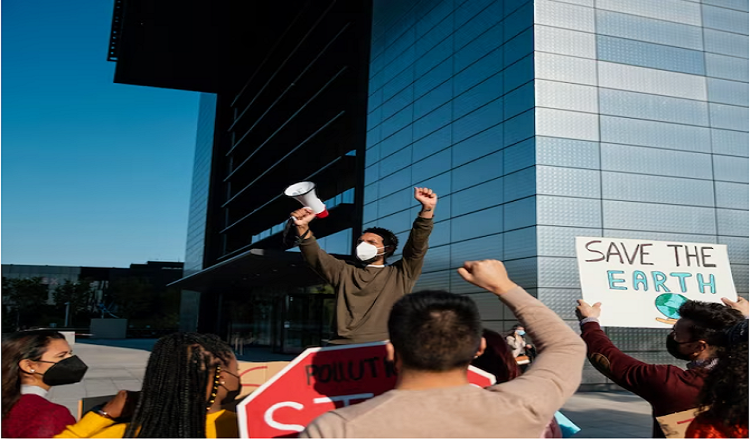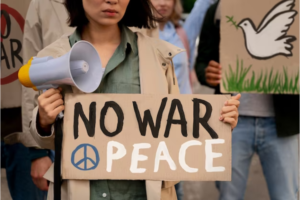Delving into the rise of civil conflicts and its implications

Civil wars have happened in the United States before, but in the last few years, there have been more of them, and they have had a big effect on society. From protests against racial unfairness to political polarisation, these fights have shown how divided the country is and what that means for the future. In this piece, we’ll talk about the rise of civil conflicts and what that means for the US. We’ll look at what’s causing this trend, how the media contributes to it, and what we can do to lessen its effects.
It is important to talk about this problem because civil wars can have long-lasting effects on a country’s social, economic, and political life. They can make inequality worse, divide communities, and even lead to violence, which can hurt a country’s security and prosperity in the long run. By knowing what causes social conflicts and what happens as a result, we can work for peace and unity in our communities and push for policies that deal with the problems at their roots.
The main point of this piece is that civil wars in the U.S. are getting worse because of political and social issues, and this has big consequences for the country’s future. By looking into the reasons for these conflicts, the role the media plays in making them worse, and possible answers, we can learn more about the problem and work to bring peace and unity to our communities.
How to understand civil wars in the US
Civil conflicts are violent or nonviolent fights between people, groups, or communities within a nation-state that are caused by political, social, economic, or cultural issues. There are many things that can cause these kinds of fights, such as discrimination, unfair distribution of resources, political polarisation, and different ideas.
The Civil Rights Movement, which tried to end racial segregation and discrimination, and the Black Lives Matter protests, which brought attention to systemic racism and police abuse against African Americans, are both examples of civil conflicts in the United States. The Women’s Suffrage Movement and the LGBTQ+ rights movement are also examples of civil conflicts that tried to give underrepresented groups the same rights and chances.
The history of civil wars in the United States goes back to the American Revolution, which was fought to get rid of British rule. The American Civil War and the Civil Rights Movement were also important civil wars in the country’s past. The American Civil War was fought over slavery and states’ rights, and the Civil Rights Movement tried to end racial segregation and discrimination. These wars have changed the country’s politics and society in ways that will last for a long time.
Causes of the rise of civil wars in the United States
Civil wars have become more common in the United States because of a number of political and social reasons. Some of the major causes of this trend are growing political polarisation, economic inequality, systemic racism, and intolerance of different ideas and cultures. According to a report by the Armed Conflict Location & Event Data Project (ACLED), political violence and civil unrest in the USA rose by 95% in 2020, with more than 10,000 incidents being recorded.
These things have had a big effect on the country’s social and political environment as a whole. Policymakers are finding it harder to pass laws and deal with important issues like healthcare, immigration, and climate change because of the growing polarisation and ideological split. Also, the rise of civil wars has made people feel afraid and unsafe, which has led to a loss of trust in institutions and a rising disillusionment with the democratic process. Taking care of these things is important if you want to reduce the effects of civil wars and make society more united and open to everyone.
The part that the media plays in making civil wars worse
The media has a big impact on how people in the USA think about and understand civil disputes. How the media report on civil wars can have a big effect on how these events are told and how they end. Sensationalism and biassed news can distort the truth and make things worse, leading to a loss of trust and more division in society.
Some news sites have covered protests against police brutality by focusing on the looting and property damage instead of the peaceful demonstrations and the reasons for the protests. This is an example of how the media can be biassed and use sensationalism to report on civil conflicts. This kind of news can reinforce negative ideas and keep people from getting along.
You can’t say enough about how much the media affects popular opinion and political debate. Biassed reporting can change how people think and feel about different groups and problems, which can have big effects on policy decisions and the way the country moves as a whole. In times of civil strife, it is important for the media to try to report in a fair and accurate way to bring people together and help them understand each other.
What civil wars mean for society as a whole
Civil wars have big effects on society, both in the short term and the long term. There can be big economic and social costs from these fights, like damage to property, loss of life, and a breakdown of trust and social cohesion. Also, civil wars can make inequality worse and make it harder for people to get along with each other.
Some examples of how civil wars have affected the United States in the past are the economic and social costs of the Civil War, which killed more than 620,000 people and destroyed much of the south. In recent years, social conflicts like the protests against police brutality and systemic racism have caused a lot of damage to property and messed up the economy. Inequalities and tensions in society have also been brought to light by these conflicts, which has led to a rising sense of polarisation and division. To lessen the long-term effects of civil disputes, it will be important to deal with their causes and encourage unity and understanding.
Possible ways to stop civil wars in the United States
To stop civil wars in the United States, you need a multifaceted plan that addresses the social and economic issues that lead to polarisation and separation. Some solutions include getting people from different groups to talk to each other more and understand each other better, addressing economic and social inequality, and making sure that everyone has the same access to justice and chances. It is very important for the government, civil society, and other groups to work together to promote these answers.
Conflict settlement and mediation programmes, economic development projects, and community-building projects are all examples of successful interventions and programmes that have helped end civil wars in other countries. In South Africa, for example, the Truth and Reconciliation Commission was a key part of bringing about healing and peace after apartheid. In the same way, a peace deal between the government and the FARC rebels in Colombia has helped to lower violence and make the country more stable. Changing successful programmes and measures to fit the unique needs of the United States can help stop civil wars and bring people together.
Conclusion
In the end, civil conflicts in the United States have become a cause for worry because rising tensions and divisions threaten social cohesion and stability. Civil wars are getting more common because of a mix of political, social, and economic reasons, all of which are complicated and interconnected. The importance of the media in shaping public opinion and the way people talk about politics is also important.
It is very important to deal with the reasons of civil wars and help people from different groups get along better and work together. Possible solutions include encouraging people to talk to each other and understand each other, addressing social and economic inequality, and making sure that all citizens have the same access to justice and chances.
It is important for everyone, including the government, civil society, and individuals, to take part in supporting peace and unity. It’s important to get people interested in making their communities more peaceful and united. This can be done by funding projects that help build communities, taking part in dialogue and understanding events, and advocating for policy changes that make social and economic equality a higher priority. By working together, we can lessen the damage of civil wars and build a society that is more fair and peaceful for everyone.
Read More You May Like:
- Defining international laws surrounding war and its effect on nations
- Analyzing the role of the UN in promoting peace and preventing conflicts
- Understanding the consequences of war on society
- The impact of modern technology on modern warfare
- Investigating the aftermath of war and peacebuilding efforts








